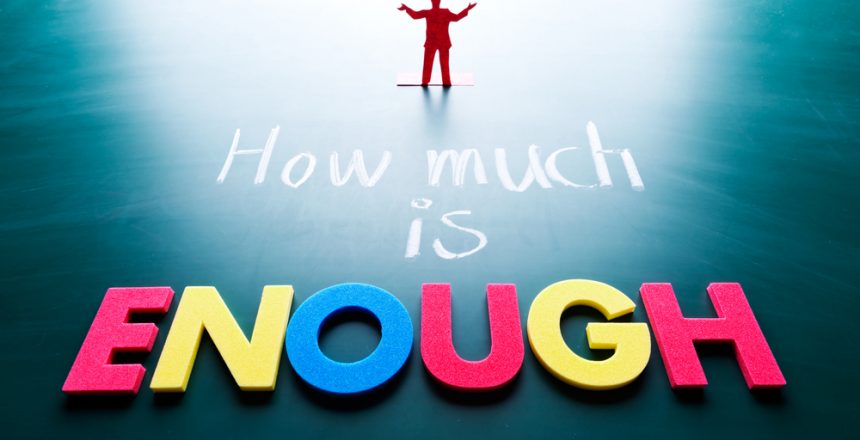In a culture of work and spend, there can be an endless search for more. However, research shows that money only affects emotional well-being or happiness up to an annual income of ∼$210,000 per family, or ~$275,000 when adjusted for the cost of living in the Bay Area.
Too much money can actually have a negative impact. Higher income levels tend to create greater demand on time, heavier workloads and more responsibility. Living in more expensive neighborhoods can increase materialistic values and social comparison (i.e. Keeping up with the Joneses). All of this in turn leads to less time for leisure activities, reflection and human relationships.
So, when is enough enough? What is your ‘enough’ point?
According to Vicki Robins, author of Your Money or Your Life, enough is a vibrant, vital place where you have awareness of the flow of money and stuff in your life. You have a life you love and no excess. It is not minimalism. Only you can determine your enough point. Here are some steps to help:
Understand the Flow of Your Money. At least half of the people I speak with do not know how much money they make or spend each year.
- What is your annual salary? Bonus, Equity? Don’t just guess, look at your HR portal or paystub to verify your compensation.
- What do you spend? If you track your spending with Mint.com, look at the Trends tab and change the period of time to Last Twelve Months. What is that number? If you don’t track your spending, start. In the interim, add up all your credit card bills for the year and spending from your bank account. By paying attention to this flow consumption tends to go down 20-25%.
- How much do you need to earn to cover your desired lifestyle?
Have a target for the big goals. Retirement is everyone’s largest financial goal. It is critical that you know whether you are on track, and if not, what will it take to get on track. Education savings is typically the next largest goal. Know what it takes to save for what you plan to pay (tuition, room & board, or everything, as well as public or private).
There are two ways to fund your goals. First, you can give your accounts a purpose. For example, retirement accounts to retirement, cash on hand goes to the Emergency Fund, 529 Plan goes to education savings. After you put your accounts towards a specific goal, you may have more you need to fund.
The second way you can fund your goals with free cash flow, which requires you to NOT spend everything you make. For example, to fully fund a UC education you need to save ~$10,000 per year. So, if you have a 4 year-old, you should have $40,000 saved for college if you plan to pay for it all.
Add it all up. How much do you need to be earning each year? What is enough?
What if you are already at ‘enough’?
Big bonuses, inheritance, IPOs should lead to making more than you need to fund your lifestyle and give you a huge opportunity to fund your big financial goals. Finding your ‘enough’ point is the first step. However, deciding you have enough is the second and harder step to take. Regardless of age, deciding you have ‘enough’ means you can restructure your time by working less and having more time for what makes you happy. This means less stress, rushing, wants, consumption, and ecological footprint.
This is often called Voluntary Simplicity or Conscious Simplicity. This favors slowing down and enjoying life again. In the United States, we think this happens once we retire. But according to Katie Barton , “The United States as a whole has surpassed the point at which increasing wealth makes us happier.” So why wait for retirement? If you reach ‘enough’ why not make the change sooner.
Conscious Simplicity also seeks to minimize dependence on institutions, like debt. I have seen a trend this year in people actively paying off their mortgages more quickly. Although debt is cheap, it is at a cost nonetheless. Consumer debt in the US is $13.85trillion, resulting in the average adult owing ~$54,553. Californians have the highest mortgage debt, which is 74% higher than the national average. Figure out how much you need to be paying off each year to ensure you are debt free by retirement (if not before).
In the U.S., we are under constant attack to consume and to work more. If this doesn’t bring extra happiness, why do it? As Buddhist teacher Haemin Sunim wrote, “Your freedom is more important than money. It is better to live the kind of life you want than to earn more and be constrained. Don’t sell your freedom.”
Daniel Kahneman and Angus Deaton (published in 2010); 2018: Happiness, income satiation and turning points around the world5 by Andrew T. Jebb, Louis Tay, Ed Diener, and Shigehiro Oishi. (Cost of living in the Bay Area, approximately 30% higher than national average per various cost of living calculators).



